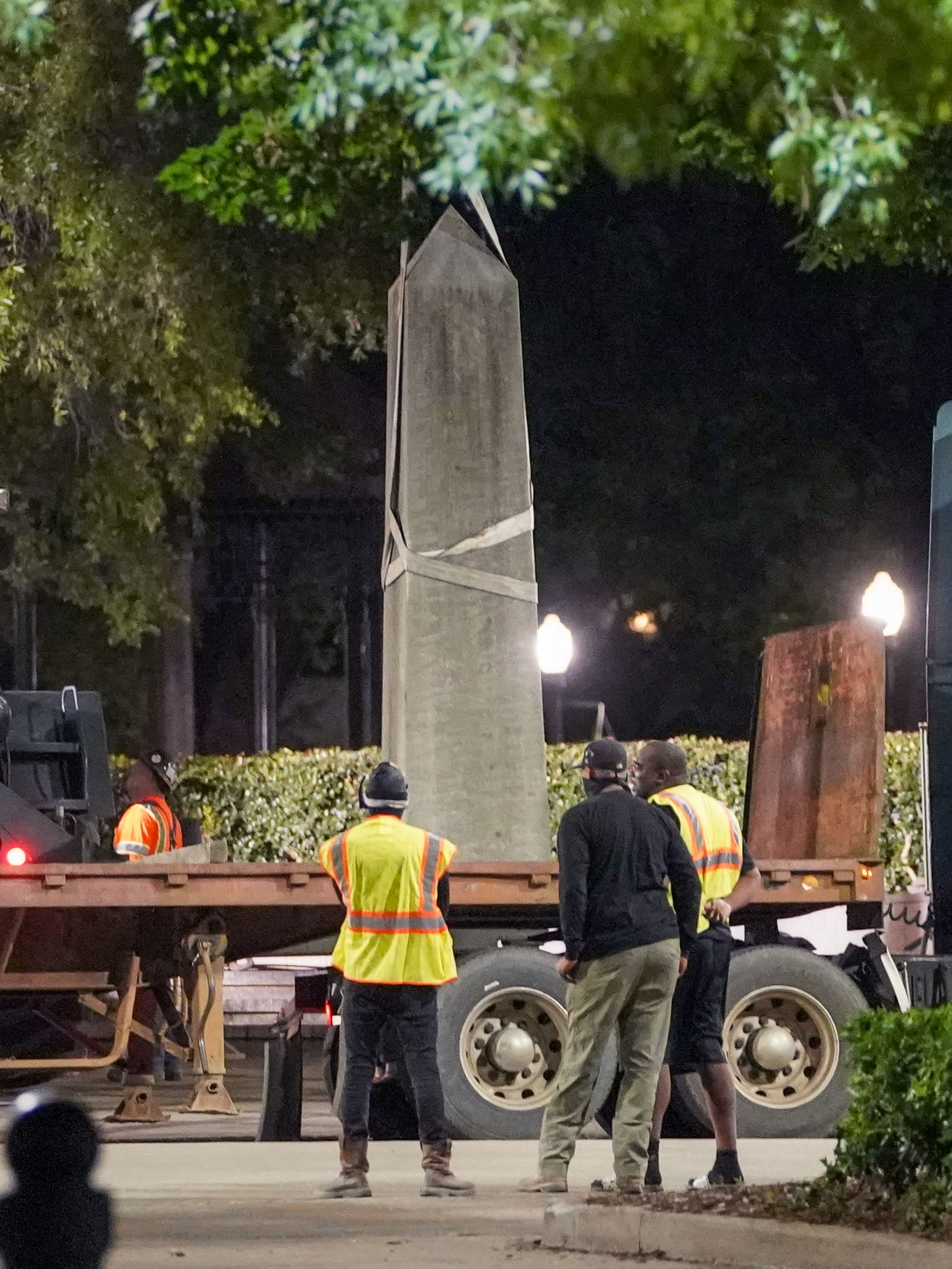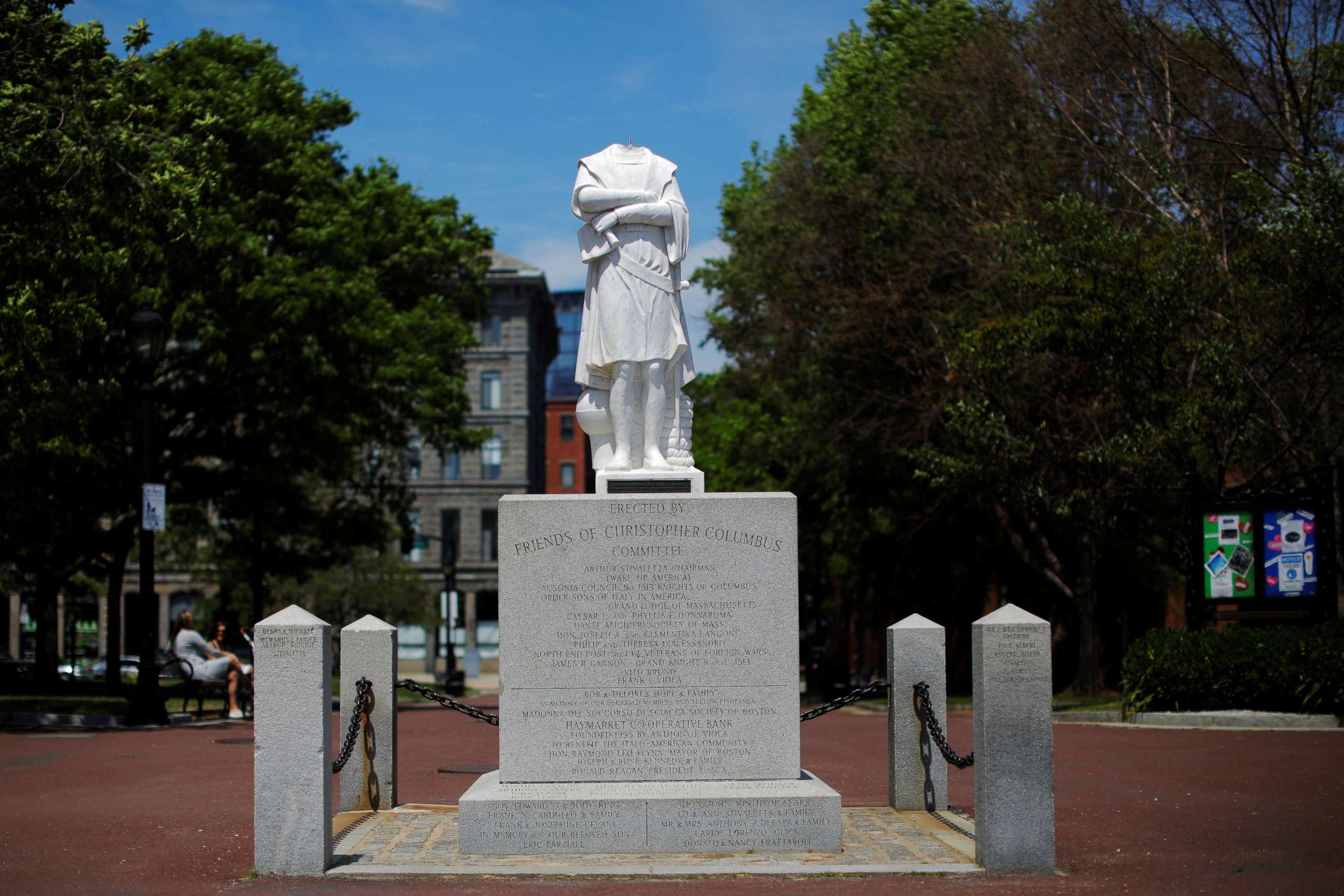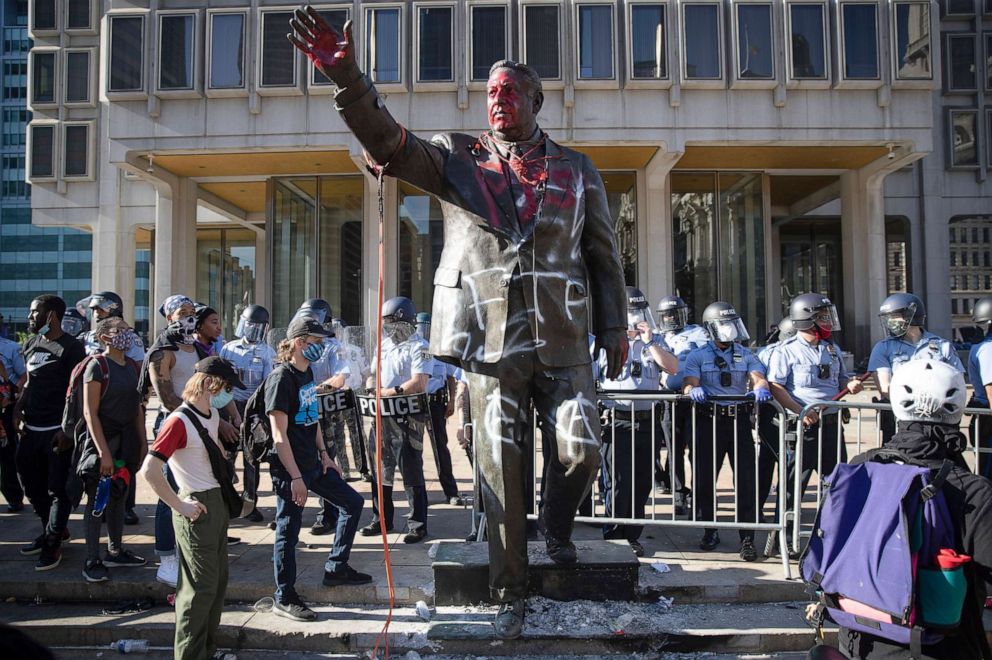Statues of Confederate figures, slave owners come down amid protests
Statues of Christopher Columbus have also been targeted.
After years of civil rights activists calling for the removal of Confederate monuments, they're falling like dominoes amid nationwide protests in the wake of George Floyd's death in police custody.
On Monday evening, the University of Alabama announced that it will remove three plaques dedicated to Confederate soldiers who attended the school. The plaques will be placed in an "a more appropriate historical," setting, according to the school.
The school will also convene a group from its board of trustees to review all of the names put on campus property and bring forth recommended changes.
"The final decisions regarding those recommendations will be made by the full Board of Trustees at a public meeting, at a time to be announced," the school said in a statement.
Hours later, the bronze topper of the Confederate monument in Hemming Park in Jacksonville, Florida, was removed early Tuesday morning. Around 4 a.m., without notice, crews used cranes to take down the statue of the Jacksonville Light Infantry that has been in the park since 1898.
Later in the afternoon, Jacksonville Mayor Lenny Curry announced all Confederate memorials in the city would be removed.
"If our history prevents us from reaching the full potential of our future, then we need to take action," he said during a news conference.
The removals followed announcements last week that Confederate monuments would be taken down from sites in Indianapolis, Richmond and Alexandria, Virginia, and Birmingham, Alabama.
The statues, which honor soldiers and leaders on the losing side of the Civil War, are seen by many as symbols of racism and oppression.

That's why the statue of Gen. Robert E. Lee in Richmond, the capital of the Confederacy, should be removed, Gov. Ralph Northam said last Thursday.
"The legacy of racism continues, not just in isolated incidents," Northam said. "The legacy of racism also continues as part of a system that touches every person and every aspect of our lives."
Those protesting Floyd's death and police brutality had gathered at the statue last week, chanting, "Tear it down!"
But Northam's plan hit a roadblock on Monday after a Richmond Circuit Court judge issued a 10-day injunction against the removal following a complaint from the statue's supporters. Alena Yarmosky, Northam's spokeswoman, said the governor is reviewing the order.
"Governor Northam remains committed to removing this divisive symbol from Virginia’s capital city, and we’re confident in his authority to do so,” she told the Richmond Times Dispatch.
Northam acknowledged that many residents won't support removing the Robert E. Lee statue, which was erected in 1890.
"I believe in a Virginia that studies its past in an honest way," said Northam, who signed legislation authorizing localities to remove Confederate statues in April. "When we learn more, when we take that honest look at our past, we must do more than just talk about the future -- we must take action."
The Rev. Robert Wright Lee, a descendant of Robert E. Lee, said he fully supports the monument's removal.
"We have a chance here today ... to say this will indeed not be our final moment and our final stand," Lee said at a press conference last Thursday. "There are more important things to address than just a statue, but this statue is a symbol of oppression."
Meanwhile, Indianapolis Mayor Joe Hogsett acknowledged the current protests in his decision to remove a monument dedicated to Confederate soldiers who died at a prison camp.
"Our streets are filled with voices of anger and anguish, testament to centuries of racism directed at Black Americans," he wrote on Twitter. "We must name these instances of discrimination and never forget our past -- but we should not honor them."
The grave monument was commissioned in 1912 and relocated to Garfield Park in 1928 following efforts by public officials active in the Ku Klux Klan to make it more visible, Hogsett said.
"Whatever original purpose this grave marker might once have had, for far too long it has served as nothing more than a painful reminder of our state's horrific embrace of the Ku Klux Klan a century ago," the mayor said. "For some time, we have urged that this grave monument belongs in a museum, not in a park, but no organization has stepped forward to assume that responsibility. Time is up, and this grave marker will come down."
If the injunction is lifted, the Richmond monument could join the fate of an Alexandria monument honoring Confederate soldiers that came down last week.
"Some said this day would never come," Alexandria City Councilman John Chapman said on Facebook last Tuesday. "The confederate statue at Appomattox is starting to be taken down. We, our community made this happen."
A Confederate monument in a Birmingham, Alabama, park was also removed last week after it was damaged in weekend protests, local ABC News affiliate WBMA reported.

Confederate monuments in Bentonville, Arkansas, and Rocky Mount, North Carolina, also will soon be taken down.
Columbus, Frank Rizzo statues also targeted
Confederate monuments aren't the only targets of vandalism recently.
This week, statues of Christopher Columbus were vandalized in two cities as protests reignited the debate over the controversial European explorer.
In Boston, a statue of Columbus in the city's North End was beheaded early Wednesday morning, according to police. The statue would be removed and put in storage while the damage was assessed, Mayor Marty Walsh told ABC affiliate WCVB.

Down in Richmond, protesters tore down a Columbus statue, set it on fire and then threw it into a lake Tuesday night, police said.
In Philadelphia, a statue of former mayor Pete Rizzo near City Hall was removed last week, following vandalism. Many saw the statue of the former police commissioner as a symbol of police brutality.
"The statue represented bigotry, hatred, and oppression for too many people, for too long," Philadelphia Mayor Jim Kenney said on Twitter. "It is finally gone."
In the wake of the statue's removal, a mural of Rizzo in the city's Italian Market also was painted over on Sunday.
It was not just in the United States that statues that symbolized racism were taken down. In Bristol, United Kingdom, protesters tore down a statue of 17th-century slave trader Edward Colston on Sunday. The protesters dragged the statue through the streets and then threw it into the river.
ABC News' Dee Carden, Benjamin Stein and Whitney Lloyd contributed to this report.




